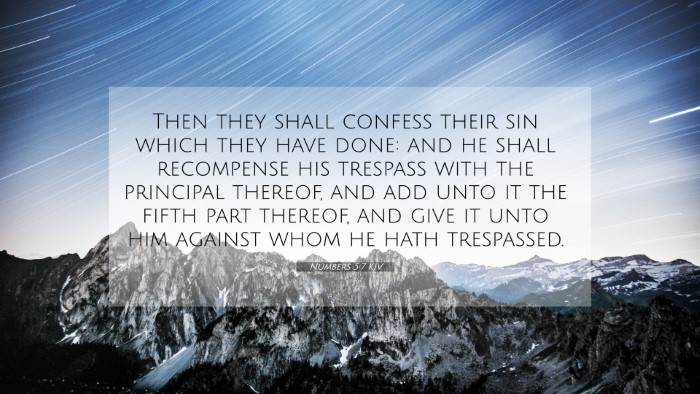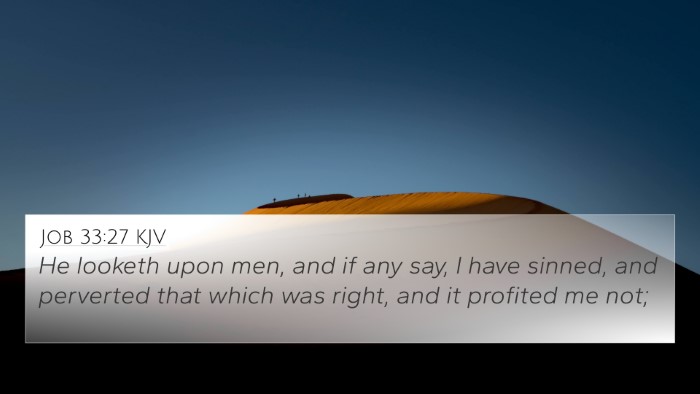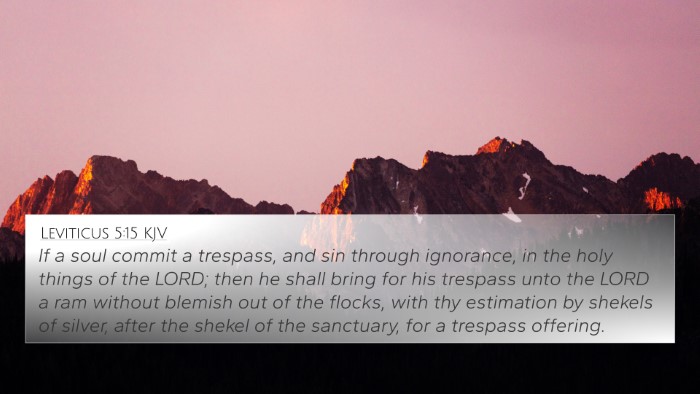Understanding Numbers 5:7
Bible Verse: Numbers 5:7
Numbers 5:7 states: "Then they shall confess their sin which they have done: and he shall recompense his trespass with the principle thereof, and add unto it the fifth part thereof, and give it unto him against whom he hath trespassed." This verse outlines the procedure for addressing sin and wrongdoing within the Israelite community, emphasizing the importance of confession, restitution, and making amends.
Key Themes and Interpretations
This verse can be seen as foundational for understanding the broader themes of sin, confession, and atonement found throughout the Scriptures. The commentaries of Matthew Henry, Adam Clarke, and Albert Barnes provide valuable insights into the meaning and implications of Numbers 5:7.
Confession of Sin
According to Matthew Henry, confession is crucial, as it involves acknowledging one's wrongdoing before both God and man. This act of confession serves to restore relationships and align the individual with God’s covenant community.
Restitution and Recompense
Adam Clarke explains that restitution involves not only returning what was taken or damaged but also adding compensation, illustrating the seriousness of the offense. The principle of restoring beyond the original loss signifies a deep concern for justice and moral order in the community.
Divine Justice and Human Responsibility
Albert Barnes highlights the balance between divine justice and human responsibility found in this verse. The requirement for recompense reflects God's justice, while the call for confession showcases His desire for humans to take responsibility for their actions.
Cross-Referencing Biblical Texts
To deepen our understanding of Numbers 5:7, we can explore various cross-referenced Bible verses that relate to its themes of sin, confession, and restitution:
- Leviticus 6:5 - Discusses the necessity of returning what is lost and adding a fifth.
- Exodus 22:1 - Outlines restitution laws for theft.
- James 5:16 - Encourages confession of sins to one another.
- Luke 19:8 - Zacchaeus's example of restitution and transformation.
- Matthew 5:23-24 - Emphasizes reconciliation before offering gifts to God.
- 1 John 1:9 - Assures us that confession leads to forgiveness.
- Proverbs 28:13 - States that he who conceals sin will not prosper, but he who confesses and forsakes it will find mercy.
Thematic Connections and Comparative Analysis
The themes present in Numbers 5:7 resonate across various sections of both the Old and New Testaments. Understanding these connections is essential for a comprehensive view of Biblical teaching.
For example, the concept of confession appears extensively in the New Testament, particularly in the epistles, where believers are urged to confess their sins and seek restoration with God (e.g. 1 John 1:9). This continuity suggests a cohesive principle within the narrative of scripture regarding human accountability and God’s merciful response.
Linking through Cross-References
The Scripture's intertwining themes can be studied through various tools for Bible cross-referencing. Using a Bible concordance or a cross-reference Bible study guide can enhance one’s understanding of how different passages relate to Numbers 5:7. For instance, exploring the concept of restitution across both the Mosaic Law and Jesus' teachings highlights the evolution of these principles through Biblical history.
Practical Application in Contemporary Life
Today, the implications of Numbers 5:7 challenge believers to take responsibility for their actions and seek reconciliation with others. The principle of making amends can be applied in various aspects of life, emphasizing the importance of integrity, honesty, and humility.
In community relationships, the act of confession and restitution not only fosters trust but also reflects the transformative power of grace in action, cementing the idea that acknowledging wrongdoing is a stepping stone to spiritual growth and restoration.
Concluding Thoughts
Numbers 5:7 encapsulates crucial principles concerning sin, confession, and restitution that resonate throughout Scripture. By examining this verse alongside its corresponding themes and cross-references, one gains a more profound understanding of both the Old Testament laws and their fulfillment in the New Testament, particularly through the lens of Christ's teachings and the call to grace.













